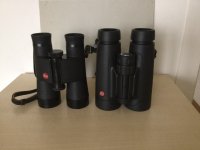Can there really be a death to the “alpha”? Will people stop using binoculars? And won’t the best of them still be called “alphas”? Although I never thought much of the word—what it quantifies is too subjective—it looks like it is here to stay.
Wouldn’t a better question to ask be whether or not the best TRADITIONAL binoculars remain at the top of the chain? Just looking across the many bino forums out there, one can see names (sometimes on the market less than 10 years) bandied about and compared to names that have been respected for over 100 years.
Are they better because of optical and mechanical characteristics? Or, are they better because of the power of suggestion and the observer’s lack of understanding of the importance of the mechanical aspects, which are just as important as the optical, at least for longevity, anyway?
‘Just a thought.
Thanks for weighing in with a lifetime's worth of experience, opinions, and perhaps a more well considered point to make. As some have already mentioned on this thread, there would be no development, research, and advancement of optical devices unless some companies were willing to spend the money to do it. Manufacturers that produce a product that is either built to spec, or re-branded, and consists of a common chassis, and/or off the shelf components are not likely to be the one's looking to improve the product.
If binoculars are truly dead in the water as optical devices unworthy of any further improvement, then maybe they are fair game for manufacturers to simply re-brand existing technology at the lowest price possible.
But, as Bill Cook recently pointed out in another thread, there are still new frontiers of optics that may very well end up in binoculars, cameras, and telescopes in the foreseeable future.
I don't deny the appeal of more reasonably priced products that approach the level of excellence of established brands. I've already wandered down that road myself. But making that choice does not come with a default rejection and/or implied condemnation of the companies that pioneered the development and improvement of these devices we are so infatuated with. If there is more to be found and improved upon, I expect it will come from either the established marques, or perhaps trickle down development from well funded university/military research, and/or camera manufacturers. I'm pretty certain that it will NOT be coming from the factories that are producing all these bargain 'alpha killers'.
One aspect of this thread's origins seems to be an almost gloating victory over the very companies that made really good optics a possibility for the consumer, as well as a complete indifference towards the prospects of any further improvement that could benefit the user. And to Bill Cook's point, what is the guarantee that any of these new businesses won't, in short order, become incapable or unwilling to support their product, regardless of their claims? I've only been on this forum for about 6 months but in that time have observed the rapid decline of the reputation of one of these 'alpha killer' businesses. Much to consider.








